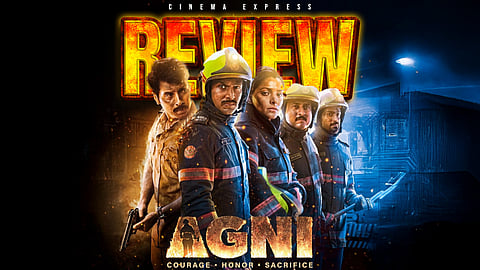Agni Movie Review: Rahul Dholakia’s smartly-written film makes for a rousing experience
Agni(3.5 / 5)
There is a delightful old-school essence spread across Rahul Dholakia’s Agni. Its portrayal of Mumbai and Mumbaikars seems to exist in a bygone era in how its protagonist, Vitthal Surve (Pratik Gandhi), displays a quaint middle-class charm. He is the chief of Parel Fire Station, staying in chawl-like quarters with diminished colours. His wife, played by Sai Tamhankar, is a homemaker who casts off evil eyes from him after work. His adolescent kid doesn’t understand his struggles and is rather more fascinated with the flamboyance of his uncle, Samit Sawant (Divyenndu), a cop who doesn’t wear his morals on his sleeves. Vitthal is always irritated, venting his frustrations in the shady bar while sharing a whisky bottle with his best friend Mahadev Nigade (Jitendra Joshi). Through all of this, Rahul is clear not to focus only on the uniform but also the scars left behind on individuals wearing it. He doesn’t give them the unidimensional, self-righteous, heroic demeanour. Instead, he makes them incessantly human.
A lifelong service in the fire department has filled Vitthal with a certain rage. He is an honest and dedicated fire officer as we see him early on jumping into a deadly fire to save children stuck inside. Apart from some medals in honour of his service, what the job has also given him is a chronic congestion in the lung. He is contrasted against his brother-in-law, who is a corrupt cop, living with his wife in a luxurious, high-rise apartment. A series of suspected arson incidents across the city brings them together in the investigation as they deal with each other’s reluctant presence. Rahul’s perception of the cops is rather simplistic, as he thinks of them more as obstacles in the way of the firefighters. In a scene, Avni (Saiyami Kher), wearing the white uniform of a fire officer, enters a crime scene only to be stopped by a bunch of middle-aged, unfit cops who are busy playing cards. There is little that humanises them as the focus stays largely on the struggles of the firefighters. It is still a minor shortcoming in an otherwise tightly woven narrative that never feels overtly sentimental.
As the story progresses, Rahul subverts our expectations into making the film run like a thriller, as it carries the pain and sacrifice of officers in the fire department. There is an effort to really give a glimpse into their everyday life as we hover around their lunch table in the afternoon, hearing anecdotes that can easily be situated in a government office setup like this. At the same time, it becomes a sharp genre piece with newer things being uncovered that give it the feel of a 90s Hollywood cat-and-mouse chase.
Streamer: Prime Video
Directed by: Rahul Dholakia
Starring: Pratik Gandhi, Divyenndu, Saiyami Kher, Jitendra Joshi, Sai Tamhankar
It does get a bit tedious in some of the VFX-heavy fire scenes, which are filmed a bit hastily and with a generic similarity in all of them. Yet, the film’s emotional highs are so delicately placed that it makes up for some of the visual chaos in these portions. The writing connects personal conflicts to collective struggles, laying bare the systemic loopholes without being didactic. It leads finally into an evocative last act, signifying rather seamlessly how the state’s failure can turn well-meaning individuals into anarchists.
The film is enhanced further by the performances. It is Pratik Gandhi’s layered and restrained demeanour that takes us deeper into his character’s psyche. Being the moral voice of the film, he doesn’t let it consume everything. Rather, it is the vulnerabilities that truly make him stronger. In the case of Divyenndu, however, it becomes difficult to really believe him as a cop, for only once do we see him wear the uniform. Often, it feels like a toned-down extension of Munna from Mirzapur that creates a disjoint in some parts. He talks, sits and behaves like a cop but seldom feels like one. Jitendra Joshi holds another surprise with an inherently compelling performance that is visceral and haunting in equal measures.
With Agni, producers Farhan Akhtar and Ritesh Sidhwani have created yet another gripping and compulsively watchable genre piece after the wildly amusing comedy Madgaon Express. Both films show a genuine effort to engage by focusing on the most fundamental aspects of the plot. Being parts of a greater narrative, they have their roots in detailed character explorations. In Agni, there is neither any pretence of being insanely serious about the subject matter nor the superficial use of cinematic tools to manipulate emotions. The music here doesn’t underline everything but is heard only to liven up the narrative. The dialogues become a gateway to engaging conversations. Everything comes together to further accentuate the themes. Ultimately, its triumph lies in going back to the basics.

